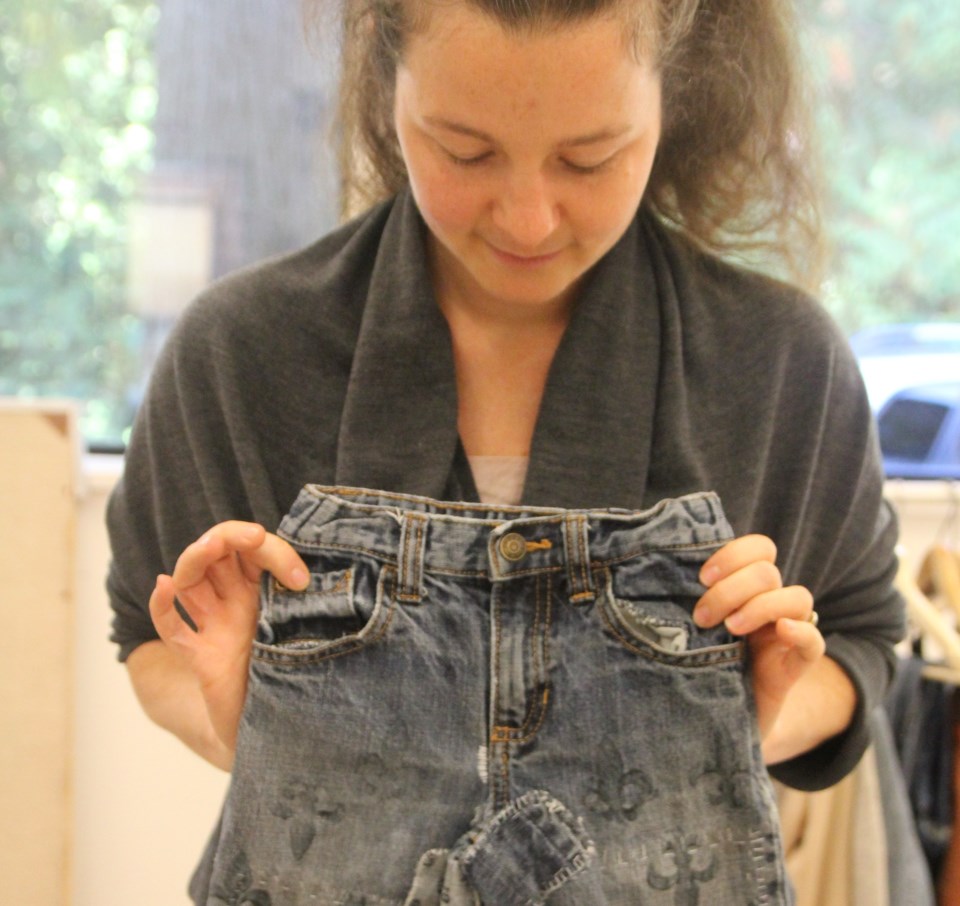If you want to stitch up your favorite, worn-through pair of jeans, all you really need is an embroidery hoop, a thread, a needle and a little love. If your kid’s jeans are perfect around the waist and still pristine, but getting a little high on the calf, you can just take denim from another pair of jeans, and add a little length. If you feel so inspired, you can add some patches just for fun, or even make a stamp and add a little extra design flair to that simple denim…
And you should, says Bowen-based fashion designer Caroline Hurd, because as easy and cheap as it may be to buy a new pair, mending and re-working your family’s jeans, and their clothing in general, is the sustainable and more ethical option.
Last week, Hurd held a workshop at BICS to help islanders take their first steps down that path to mending, adjusting, and infusing their clothing with new life.
“I’m very interested in sharing what I’ve been working on in the past number of years, which is helping my family’s clothes last longer,” says Hurd. “As a fashion designer, I am saddened by the culture of fast fashion. We’ve gotten into the habit of buying things that don’t last, because they are cheaply made. As an industry professional, I feel like it is my responsibility to inform people and help change habits.”
Before becoming a mother, Hurd worked as a designer for major fashion retailers in Montreal and Europe including Jacob, Tristan & America and Marina Rinaldi.
“In Europe I learned a particular mentality surrounding clothing while working in the high-end fashion world,” says Hurd. “People would put big ticket clothing items like a coat, or a really nice sweater, into their annual budget, they would buy classic items and wear the same clothes a few times per week.”
She says that “fast fashion,” which essentially makes the latest trends accessible to the average consumer by optimizing aspects of the supply chain, started growing in Canada with the arrival of H&M, around the time of her daughter Éliane’s birth 12 years ago.
“Becoming a mother, I was shocked by the amount of clothing you go through as a parent, just because your kid is growing so much in those first years,” says Hurd. “I was really grateful to land on Bowen and find not only the Knick Knack Nook, but also all the second hand clothing sales including the Montessori sales, which are geared towards small children. When your kids are little, they grow so fast that their clothes are often gently used after being handed down, but I would get annoyed with all the stains so started designing patches to cover them – or shortening cuffs. This kind of mending kept my creative juices flowing, and was also just a practical solution.”
She says this work has led her to research the possibility of bringing textile recycling to Bowen Island (so far, this remains a costly option), but in the mean time – helping people hold on to their clothing for longer, or avoid buying brand new clothing, is a great step.
She plans on running more workshops, including more advanced offerings for people who already know how to sew, in the near future. Keep your eyes peeled for information on those from Bowen Island Rec.
True cost of fast fashion
- Websites like Instagram promote the idea that you must never be seen wearing the same thing twice
- The fashion industry is the second largest polluter in the world after petroleum
- 1,800 gallons of fresh water are needed to make 1 pair of jeans, the dyestuff used is chemical and there are no policies protecting water sources so dumping is common.
- Cotton is grow in hot climates and are known to cause droughts, dry up lakes.
- Polyester the most highly used fiber cannot yet be recycled on a large scale.
- The average salary of a textile worker in Asia is 2$ per day.
Benefits of mending
- Mending like all hand work have the same psychological benefits as meditating
- Cost effective
- Sustainable
- You can use clothing as a canvas for your creativity



